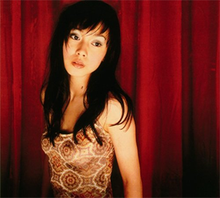Shokumotsu Rensa
This article has multiple issues. Please help improve it or discuss these issues on the talk page. (Learn how and when to remove these messages)
|
| Shokumotsu Rensa | ||||
|---|---|---|---|---|
 | ||||
| Studio album by | ||||
| Released | September 4, 1996 | |||
| Recorded | 1996 | |||
| Genre | Pop | |||
| Label | For Life Records | |||
| Producer | Ryuichi Sakamoto | |||
| Miki Nakatani chronology | ||||
| ||||
| Singles from Shokumotsu Rensa | ||||
| ||||
Shokumotsu Rensa (Japanese: 食物連鎖, transl. Food Chain) is the debut studio album by Japanese singer Miki Nakatani. It was released on September 4, 1996, by For Life Records. Following her departure from the girl group Sakurakko Club in 1993, Nakatani concentrated on her acting career, before returning to music under the tutelage of musician Ryuichi Sakamoto.
Nakatani was noted for her "cool" vocal performance on Shokumotsu Rensa, and the album features contributions from Taeko Onuki, Yasuharu Konishi of Pizzicato Five, and Arto Lindsay.
The album was preceded by two singles: "Mind Circus" and "Strange Paradise", the former of which peaked at number twenty on the Oricon charts.
Background
Nakatani began her career as a member of the girl group Sakurakko Club, performing with the group from 1991 to 1993. During this time, she formed the duo Key West Club.
In 1995, Nakatani dueted with producer Ryuichi Sakamoto on "Aishiteru, Aishitenai" (愛してる, 愛してない, transl. "Love You, Love You Not") from his twelfth studio album, Smoochy. Nakatani herself had always been a fan of Sakamoto's work, and frequently attended his concerts.[1] During a chance encounter, the two hit it off after learning that their tastes and hobbies matched. Sakamoto reportedly held a long-term desire to produce a female artist, and others opined that Nakatani saw it as an opportunity to dispel her idol image.[1][2] The web magazine Pop Master compared their partnership to that of French musician Serge Gainsbourg and actress Jane Birkin.[2]
Lyricist Masao Urino was recruited by Sakamoto to work on the album, writing the words to five demos. In a 2016 retrospective with Oricon, celebrating 35 years of Urino's work, he recounted that period as one of the longest in his career, as he pressured himself to match the quality of Sakamoto's "imposing" arrangements and spent a month on each song. Urino reflected on their collaboration with fondness as Sakamoto gave him a newfound confidence, teaching Urino to write with "instinct".[3]
Critical reception
CD Journal gave the album a positive review, comparing Nakatani to singer Tomomi Kahala and highlighting the "gorgeous" contributions by Onuki and Konishi.[4] Despite Nakatani's weak vocals, Cyzo magazine praised its ability to "sew skillfully" and balance Shokumotsu Rensa—in that it neither relied on "fluffy" atmospherics, nor did it rely on "diva" vocals front and center. As part of a feature evaluating Japanese actresses' forgotten music careers, Cyzo awarded Nakatani three stars for her singing ability and a "0" for her "dark past" or kurorekishi (黒歴史), meaning that the album and her subsequent works were regarded highly.[5]
Track listing
All songs composed and arranged by Ryuichi Sakamoto except where noted.
| No. | Title | Lyrics | Music | Arrangement | Length |
|---|---|---|---|---|---|
| 1. | "Mind Circus" | Masao Urino | |||
| 2. | "Strange Paradise (Paradise Mix)" | Sakamoto | |||
| 3. | "Aibiki no Mori de" (逢いびきの森で "In the Forest of Encounters") | Yasuharu Konishi | Konishi | Konishi | |
| 4. | "Yogoreta Ashi The Silence of Innocence" (汚れた脚 "Dirty Legs") | Urino | |||
| 5. | "My Best of Love" | Taeko Onuki | |||
| 6. | "Where the River Flows" | Urino | |||
| 7. | "Tattoo" | Miki Nakatani | |||
| 8. | "Shikisai no Naka e" (色彩の中へ "Into the Colors") | Hiroshi Takano | Vinicius Cantuária | ||
| 9. | "Lunar Fever" | Takano | Toshiko Mori | Mori | |
| 10. | "Sorriso Escuro" | Urino, Arto Lindsay, Cantuária | Lindsay, Cantuária |
- Tracks 1, 2, 6, 7, and 9 are stylized in all uppercase.
- Tracks 5 and 10 are stylized in all lowercase.
Charts and sales
| Chart (1996) | Peak
position |
Sales |
|---|---|---|
| Oricon Weekly Albums[6] | 5 | 131,000[6] |
References
- ^ a b "Clamp of the Week: Miki Nakatani". www.fujitv.co.jp. Retrieved November 27, 2021.
{{cite web}}: CS1 maint: url-status (link) - ^ a b "【音楽レビュー】食物連鎖/中谷美紀 | POP MASTER" (in Japanese). 2017-09-30. Retrieved 2021-11-27.
- ^ "35周年を迎えた作詞家・売野雅勇氏 明菜、チェッカーズらヒット曲誕生秘話語る". Oricon News. July 9, 2016.
- ^ "中谷美紀 / 食物連鎖 - CDJournal". artist.cdjournal.com (in Japanese). Retrieved 2021-11-29.
- ^ "鈴木蘭々の隠れた才能、黒木メイサはいきなり迷走? 意外なアノ女優たちのCDデビュー歴を暴く!". サイゾーpremium. Retrieved 2021-11-29.
- ^ a b "オリコンランキング情報サービス「you大樹」" [Oricon Ranking Information Service 'You Big Tree']. Oricon (in Japanese).
{{cite web}}: CS1 maint: url-status (link)
